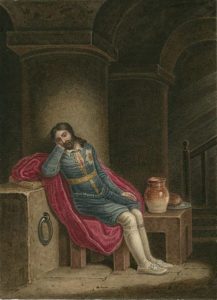In today’s bonus episode, we look at the origins of the terms “murder” and “malice aforethought.” We see that “murder” comes from a few sources, including murdrum and morth. In the end, murder becomes strongly associated with secret killing, killing with no witnesses, or killing somewhere remote. This association brings the concept of murder closer to the concepts of ambush and premeditated killing. Perhaps this explains why murder ends up being defined as killing with “malice aforethought,” a term which also strongly implies ambush and premeditation.
I gloss over a lot of debates in this one. First, I should point out that William the Conqueror may not have invented the murdrum fine, and that it might predate the Norman conquest and go back to the Danish conquest. The debate on this issue seems to stem from confusion among the medieval sources – one famous medieval legal writer, Bracton, says the law goes back to the time of the Danish King Canute, but earlier sources attribute the law to William. For more on this, see:
- O’BRIEN, BRUCE. “Conquest and the Law.” In Conquests in Eleventh-Century England: 1016, 1066, edited by Laura Ashe and Emily Joan Ward, NED-New edition., 41–64. Boydell & Brewer, 2020. https://doi.org/10.2307/j.ctvrdf1qb.8.
- And check out Maitland’s essay on the Criminal Liability of the Hundred [the name of the community that was fined with the murdrum fine] in The Collected Papers of Frederic William Maitland, ed. H.A.L. Fisher (Cambridge University Press, 1911). 3 Vols. Vol. 1.
For more on morth, check out Thomas Green’s article (cited in episode 2), O’Brien, Maitland, and Johnson, Nelson E. “The Early History of the Crime of Murder.” Brief, vol. 6, no. 4, 1906, p. 269-275. O’Brien argues that morth has more to do with a kind of killing for which the victim’s family cannot receive compensation (perhaps because the perpetrator is unknown), as well as with treachery and treason.
You can find Richard II’s statute on pardons if you have access to the volume of works called Statutes of the Realm. You can access the Statutes of the Realm via Heinonline. The citation is 13 Rich 2 c2 1389-90, also known as the Statute of Westminster (1390).

A painting by J. Coghlan
of Richard II languishing in prison. Presumably he is regretting his earlier lenience towards traitors and murderers.
Here is poor Richard, learning the hard way that murder and treason are no laughing matter.
Finally, if you are curious about the debate over whether “murder, killing by await, assault, or malice prepensed” is a list of synonyms or if they’re all different concepts, check out Thomas Green’s article, where he disagrees with historian J.L. Kaye on this. I’m on Team Green for this one.